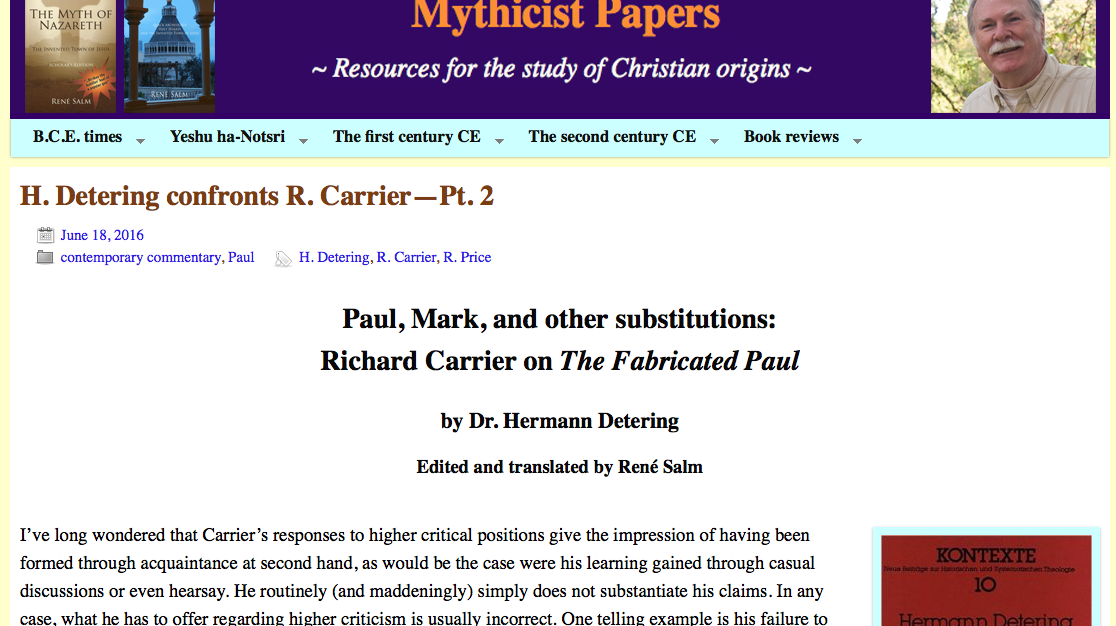Continues from part 1 . . . .
Philip Jenkins in his reaction, The Myth of the Mythical Jesus, has an even more blunt response to anyone who ventures into the “far swamps of extreme crankery” by pursuing questions that have no place among biblical scholars:
“Scholarship is what scholars do, and if they don’t do it, it’s not scholarship.” That is by far the most important point against the mythicists, and really, nothing more needs to be said.
Jenkins remains silent about Carrier’s book, the book that largely prompted Brian Bethune to ask serious questions about the evidence for the existence of Jesus. One can only conclude Jenkins has not read it and that his confidence that he knows all he needs to know about mythicist arguments is perversely misplaced. After all, it’s not a view “done” by scholars so it would be a waste of time bothering with it. One cannot imagine a more classic illustration of contempt for (ideologically incorrect) public interests.
Such ignorance gives him the confidence that merely repeating a few mantras to a few informal mythicist bylines he may have heard second hand or from some “over zealous riff-raff on the web” is all that he needs to do to persuade right-thinking people to stay clear of the danger zones around those far swamps.
The affirmative evidence for that existence is easily offered, consisting as it does of a sizable body of writings dating from within a half century of the events described.
Those documents are, without question, the most closely debated and analyzed in human history. A vast body of scholars works on those texts and their implications, and they come from a wide body of religious backgrounds – Christians of every possible shade, Jews, skeptics and atheists, and people of various other faiths. Within that scholarly universe, the number of qualified scholars who today deny the historical existence of Jesus is infinitesimal. The consensus on that matter is near-total. (My bolding and formatting in all quotations)
“A paper I had written on a disturbing, ridiculous, and idiosyncratic method used by historicists was rejected by a prominent society of Biblical literature, but was later accepted by a general historical research organisation – forgive me if I feel a smug sense of vindication.[32] This paper dealt with what I call Ehrman’s law, which shall be explained later and discussed throughout this book. My presentation of the paper was very successful, with almost everybody (a room full of proper historians) agreeing with me that this method used by Biblical ‘historians’ is ridiculous and not typical of historians proper.
“[32] Raphael Lataster, “The Gospel According to Bart: The Folly of Ehrman’s Hypothetical Sources” (paper presented at the Annual Conference of the Australian Historical Association, Sydney, 7th July 2015).”
Lataster, Raphael (2015-11-12). Jesus Did Not Exist: A Debate Among Atheists (Kindle Locations 400-405). . Kindle Edition.
Mainstream biblical scholars often point to atheists among their ranks as evidence that they are not swayed by Christian bias. Craig Evans in the debate mentioned in my previous post did this when he spoke of the atheist James Crossley arguing that the Gospels were written considerably earlier than even many Christian scholars concede. What Evans was doing in reality was demonstrating that atheist scholars can only survive in the Christian dominated field of biblical studies as long as they conform to the minimal ideological foundations of Christianity. Arguing a Marxist model of Christian origins naturally conforms admirably with the values of many liberal Christians.
In fact neither Bethune nor anyone denies the “near total consensus” in the public face of the biblical studies guild. When prominent authors like Philip Jenkins not only demonstrate their ignorance of the arguments of those “infinitesimally” few scholars but even despite their ignorance insult them as belonging to the “far swamps of crankery”, one has to wonder if Raphael Lataster is quite correct when he writes that the historicity of Jesus is a debate that cannot be conducted among biblical scholars but can only move forward in other history and religion departments.
Hence reaction, neither engagement nor education, is the response.
Jenkins sees no need to bother with anything Carrier might have written nor even with the actual problems raised by Bethune. Leave all that to the “swamps of extreme crankery” — a nice intimidating phrase attached to the pointy headed doubters among those leprous masses.
And so Jenkins proceeds to address what he blindly presumes anonymous ignoramuses argue. The challenging questions of Bethune and Carrier are lost in the far swamps of Jenkins’s awareness and are replaced by some vague general points from the minds of an undefined “they”.
The first vague point unrelated to any of the questions troubling Bethune and that is posed as a substitute for Bethune’s questions:
- *Contemporary writers do not refer to Jesus
Jenkins’s ignorance of serious mythicist arguments is palpable. Sweeping aside the issues of concern to Brian Bethune and many readers of the Macleans article, Jenkins embarrasses any slightly knowledgeable reader with this “explanation”:
All the canonical sources depict a very plausible Jesus in a very identifiable early first century historical setting. More significant, there are clear and well understood chains of evidence and tradition from Jesus’s time to the writing of those gospels.
Plausibility is a condition of historicity but that is a long step from being an argument for any particular scenario. Historical fiction works because it is equally plausible, set as it is in real times and places. That this point is ever raised as a serious argument for the historicity of Jesus is truly an embarrassment to our intellectual elites. Craig Evans made much of it in his debate with Richard Carrier. Why? It’s so obviously a red-herring, a non sequitur, an offence to anyone who has read any historical fiction, including ancient historical fictional writings.
As for the second point that there are “clear and well understood chains of evidence and tradition from Jesus’s time to the writing of the gospels”? Well, yes, there certainly are “clear and well understood” imaginative constructs of what scholars who presume a core historicity behind the gospel narratives believe must have existed. Of course there is no evidence for those oral traditions. Indeed, works that have seriously challenged the prevailing presumption that “there must have been oral traditions” passed on from eyewitnesses to eventually reach the authors of the gospels have been largely ignored. (See discussions of some of these in the oral tradition archive, as well as other posts on scholarship presenting evidence for literary mimesis.) Yet Jenkins presents the presumed model of oral tradition as part of a “clear and well understood chain of evidence“!
Clearly unaware of his ignorance that the mythicist case for Jesus as an “otherworldly being” is grounded in the writings of
- the New Testament epistles
- and Revelation,
- other Second Temple Jewish literature,
- and documents such as the original form of the Ascension of Isaiah dated by mainstream scholars to the end of the first or very early second century,
Jenkins surely mystifies readers of Macleans and Carrier’s book when he writes: Continue reading “Biblical Scholars Reacting . . . Part 2”
Like this:
Like Loading...
 Was there a historical Demonax?
Was there a historical Demonax?






